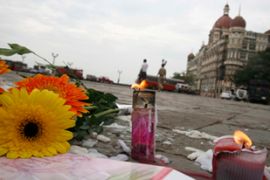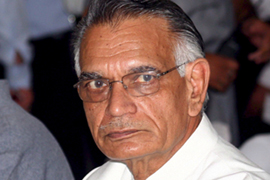Indian security official resigns
Federal home minister steps down as Mumbai mourns its dead and investigation picks up.

Matt McClure, Al Jazeera’s correspondent in Mumbai, said Patil’s decision to step down was not a “total surprise” given opposition parliamentarians have repeatedly called for him to resign over the string of attacks in India in the past 12 months.
However, he said that while Patil’s resignation was in keeping with the concept of ministerial responsibility “the Indian police and intelligence services need to be modernised and better co-ordinated”.
‘Pakistani elements’
The news came as Mumbai began to mourn its dead and security officials stepped up their investigation into the attacks.
Accusations that “Pakistani elements” were behind the violence have been denied by Islamabad, which has called on India to share evidence.
Pranab Mukherjee, the Indian foreign minister, said: “According to preliminary information, some elements in Pakistan are responsible.”
With the suspicion that elements in Pakistan were involved, the Indian government is considering suspending peace talks with its neighbour, the Press Trust of India (PTI) reported.
| In depth |
|
|
“There is a view in the government that India should suspend the peace process and composite dialogue to show that it is not going to take lightly the deadly carnage in Mumbai,” the official news agency quoted an unnamed officials as saying.
Kanwal Sibal, a former Indian foreign secretary, told Al Jazeera: “We have been put in an extremely difficult situation where, on the one hand we need to respond – we must respond, otherwise we lay ourselves open to more such attacks in the future.
“On the other hand, we also want the democratic government in Pakistan to survive and we do not want the armed forces to come back.”
Some Indian officials have suggested the attackers could be linked to the Pakistan-based Lashkar-e-Taiba group, who oppose Indian rule in Kashmir.
But Assad Durrani, a former head of Pakistan’s Inter-Services Intelligence (ISI), told Al Jazeera: “I heard that India would be prepared to share their intelligence with Pakistan, so that is already a positive move, because that has been a problem in the past.
“And, in most cases, if I recall correctly, it turned out that either they did not have any good proof or someone else was responsible.”
Earlier Shah Mahmood Qureshi, Pakistan’s foreign minister, said: “Our hands are clean, we have nothing to hide and nothing to be ashamed of because this government feels that good neighbourly relations with India are in the interests of Pakistan.”
Ten targets
The attackers launched their assault on Mumbai on Wednesday night, attacking 10 targets across the city and holding dozens of hostage at the Taj Mahal and Trident-Oberoi hotels.
At least 20 police officers and more than 141 civilians – including 22 foreigners – were killed during the violence.
Indian officers say they killed nine of the attackers – who have been described as well-armed and highly trained – and are interrogating a man that they claim is the sole attacker captured alive.
Questions are being asked about how it was possible for as few as 10 men to take control of so many locations for as long as three day – and why it took three hours to mount a rescue operation.
Prakash Singh, former director-general of the Indian police force, said that investigators would still be considering whether a large number of terrorists were involved in the attacks.
 |
| Patil submitted his resignation following the Mumbai attacks [EPA] |
“Although the Mumbai police are saying it is just 10, it is possible some disappeared into the urban conglomeration that is Mumbai … and significant local support has got to be there too. Maybe more names will come out as the investigation progresses,” he said.
A previously unknown group calling itself the Deccan Mujahidin has claimed responsibility for the string of attacks – but it is unclear whether the group is India or Pakistan based.
Brigadier Shaukat Qabir (retired), of the Islamabad Policy Research Unit, told Al Jazeera the attack bore the hallmarks of an al-Qaeda inspired assault.
“There is only one statement [available] from the person that they [the Indian police] have captured … that they were instructed to target Israelis and foreigners because they wanted to take revenge for Palestine which indicates an al-Qaeda connection,” he said.
India’s private NDTV reported on Sunday that a six-man FBI team had arrived in Mumbai to help with the investigation.

 Timeline of Mumbai attack
Timeline of Mumbai attack